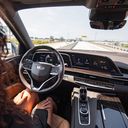The hands-free driving function on your car may be too polite for its own good

Assisted-driving features are supposed to make cars safer and relieve some of the monotony of driving, but if your robot sidekick's driving style doesn't match your own, it could lead to unexpected dangers.
The big picture: Reliable, fully driverless cars are still a long way off. Until then, motorists will share driving duties with partially automated, assisted-driving systems, and they need to know what to expect from them.
I almost got into trouble on a Detroit freeway recently when the 2021 Cadillac Escalade I was driving turned out to be far more cautious than I expected.
Background: The Caddy was equipped with Enhanced Super Cruise, GM's hands-free highway driving system, which is rated safest by Consumer Reports.
What happened: I steered the Escalade to the center lane of I-94, switched on Super Cruise and relaxed, placing my hands in my lap.
- A few minutes later, the Escalade unexpectedly slowed from 66 mph to 49 mph.
- Uncertain about what was happening, and with cars swerving to pass me on the left, I grabbed the wheel and accelerated, automatically disengaging Super Cruise.
What I knew: A driver in the right lane had been attempting to pass me on the right, but was prevented from doing so by a slower-moving vehicle in its own lane.
- I — like most drivers would, in my opinion — dismissed the out-of-luck aggressive driver. But the Cadillac wanted to give him a wide berth.
What they're saying: GM engineers weren't in the car at the time, of course, but they told me later that the Escalade likely sensed the other vehicle was too close to my lane, and slowed as a precaution. The Escalade behaved as designed.
Yes, but: It was disconcerting because I didn't expect the car to be so polite. That's not how I drive — and the sudden slowdown actually seemed a little dangerous to me, given the surrounding traffic on the interstate.
The bottom line: Driving is often a series of split-second decisions. If the driver and their robot assistant aren't in tune, it could lead to a lack of trust — or in the worst case, even accidents.
- People have different personalities behind the wheel. Maybe self-driving cars might, too, some day.